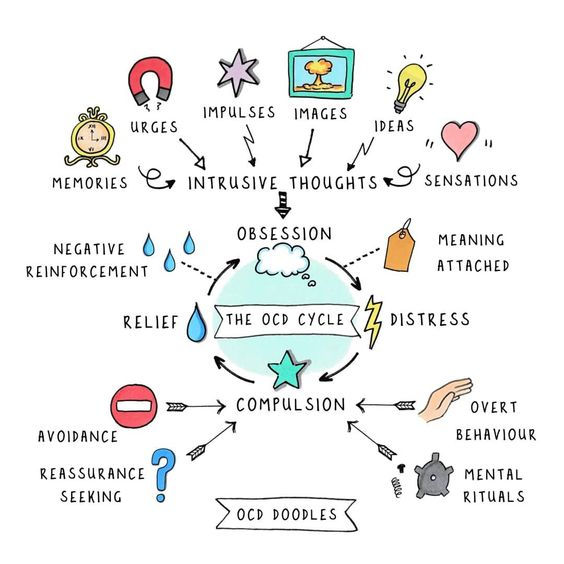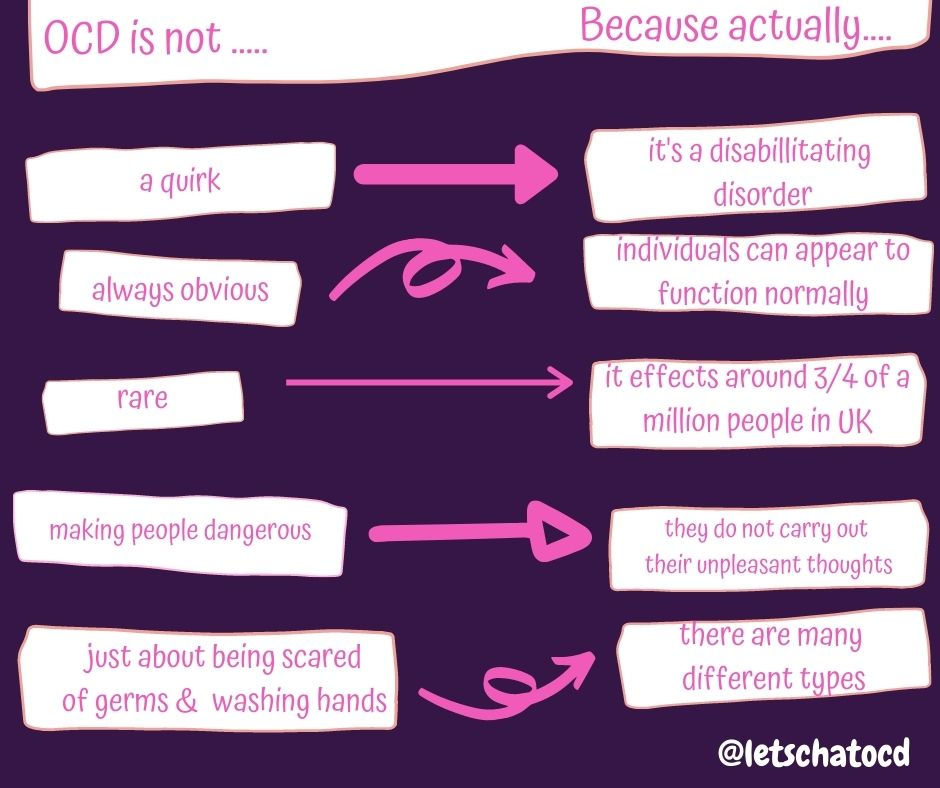What even is OCD?
- letschatocd
- Jul 28, 2020
- 6 min read
Hello lovely,

There is an endless list of misconceptions that people have about OCD. Of course, none of these are true and do not help to spread a positive message about OCD. Instead these lead to inaccurate portrayals, false stereotypes and stigma surrounding the condition. The misconceptions come from a lack of education and knowledge. This is why it’s so important to spread awareness of the condition. However, how can we expect to have a conversation about OCD if people don’t even know what is. So what better place to start the conversation about OCD on this blog, then asking the question what even is OCD?
OCD stands for Obsessive Compulsive Disorder. It is a common, anxiety-related mental health condition where people experience frequent distressing thoughts (obsessions) and/or behaviours (compulsions).
“In a nutshell, OCD is a problem of trying too hard to reduce the threat of harm” – Ieso Digital Health
Let’s break it down….
Obsessions
Often referred to as intrusive thoughts, these are repeated unwanted thoughts, images, urges, worries or doubts which an individual can’t ignore or control. Common themes for these thoughts include but are not limited to, harm, relationships, contamination, sexual and maternal. These may be triggered by a stimulus or they may appear automatically. No matter why they appear they cause unpleasant feelings such as ‘mental discomfort’, anxiety, disgust and distress. It is this anxiety felt by people with OCD that makes these thoughts difficult to ignore, despite the majority of people with OCD realising their thoughts are irrational.
This is the difference between people with OCD and without OCD. The majority of people will have similar thoughts to those which people with OCD experience. However people without OCD are able to brush these thoughts away and ignore them whereas those with OCD can not let the thoughts go and instead focus all their attention on them. This causes these thoughts to appear more and more often.
It is important to note, that despite having these thoughts, people with OCD do not carry out these thoughts. They are not dangerous towards others and any comments that suggests otherwise continues the stigmatisation of the disorder.
Compulsions
These are repetitive behaviours or mental acts (sometimes referred to as rituals) that aim to manage, push out or reduce the unpleasant feelings triggered by the obsessions. These can be 'overt' obvious behaviours such as cleaning, touching or checking, or they can be 'covert' hidden mental rituals such as counting, repeating things, questioning or mental checking. People with OCD feel compelled and are forced to perform these actions to relief their anxiety, prevent the perceived harm or lessen the chance of the obsession being triggered. However, this only brings a temporary relief from the anxiety until the obsession is triggered again. This creates a continuous vicious cycle that helps to keep OCD going. The urge to perform compulsions becomes stronger each time because people with OCD are not able to give themselves the chance to see that the perceived threat or harm will not actually occur. This is because the compulsion is strengthened through negative reinforcement due to the anxiety being removed.

Disorder
This is arguably the most significant part of OCD. The distress and impairment to daily life caused by the obsessions and compulsions is what makes OCD a disorder, and a debilitating one at that. Sometimes symptoms of OCD are manageable and other times they can be completely debilitating, especially when an individual is already stressed. Symptoms may also not always obvious and the individual may appear to be functioning adequately however, they are likely to be suffering under the surface. No matter whether OCD is obvious or not, it will have a huge impact on many areas of an individual’s life.
Ways OCD may impact the functioning of everyday life:
· Time Lost: People can lose many hours of their day due to the amount of time thinking about obsessions and carry out compulsions. They may even be compelled to perform their compulsions for several hours at one time.
· Relationships: OCD not only effects those with the condition but also those closest to them. Therefore, the pressures of living with OCD may put strain on relationships. This may be due to reasons such as finding certain people or places triggering, not being able to leave the house, not having the time or energy due to numerous rituals or a lack of understanding by other people.
· Ability to work: OCD may make it difficult to leave the house or travel to work. It also does not leave when you are at the office desk. It may disrupt you at work or you may not be able to concentrate.
· Physical side effects: The distress caused by the obsessions has the power to cause panic attacks as well as anxiety attacks. Which anyone who has experienced them will tell you are absolutely horrific and can take time to recover from. Other physical side effects of anxiety may include headaches, nail biting etc. Compulsions may also have a detrimental effect on physical health, for example cleaning rituals may damage an individual’s skin.
· Other mental illnesses: The toll OCD causes can also lead to the experience other mental health disorders such as anxiety, depression and suicidal thoughts.
"OCD was once ranked by the World Health Organization in the top 10 of the most disabling illnesses by lost income and decreased quality of life" - OCD-UK
Despite it is common for OCD to impact the functioning of everyday life, it is important to keep in mind that everyone’s experience is different. Just like any illness OCD manifests itself differently in every person causing everyone to have a unique experience. No matter what that might be, everyone’s experience of OCD is valid.
Just like any mental health condition, OCD does not discriminate. It can affect anyone no matter their age, sex, gender or social and cultural background. Symptoms can develop at any age, however it is common for symptoms to develop around puberty and young adulthood. One example of OCD developing in adulthood is perinatal OCD which can develop while an individual is pregnant or after they have given birth. It is also believed that slightly more women than men are affect by OCD.
OCD is not rare and you are not alone. It has been estimated to affect 1-2% of the population which means there are roughly three quarters of a million people living with OCD here in the UK. However, due to the nature of OCD having an impact on daily life including relationships, not only are those with the disorder suffer the effects of OCD but also families or those who live with them. Therefore, it is believed that over 1 million people are affected by OCD in the UK.
This number has been underestimated in the past due to people with OCD not seeking help due to not knowing OCD can be treated or due to being frightened to seek help. This is not surprising given the mixed responses and stigma people with OCD face on a daily basis. If you currently working up the courage to seek help, I promise it is not as scary as it seems and is life changing once you do. This is why we need to create a conversation around OCD so that people never have to suffer through OCD alone.
Although OCD sounds horrendous, which honestly it is, there is hope. Symptoms can be eased and treated by several different methods such as medication (e.g. through the use of SSRI’s - selective serotonin re-uptake inhibitors) and psychological therapy (e.g. Cognitive Behavioural Therapy). Please remember help is available and you are not alone.

Thank you for taking the time for reading, I hope this knowledge will replace any misinformation you had developed due to the stigma surrounding the condition.
As someone who lives with OCD, I want people to have an idea of what OCD is so they are informed. But I don’t expect anyone to be an expert in it. I wouldn't even consider myself an expert even though I’ve experience OCD since I was a child. I’m still learning in every therapy session and through other people’s experiences. But by having a basic understanding, it will help fight the stigma associated with the condition.
Keep chatting and take care,
Love, H x
Further information on OCD can be found using the following links:
Mind: shorturl.at/qESY2



Comments